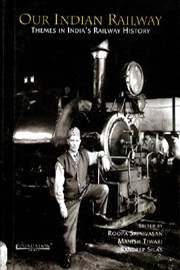Book contents
- Frontmatter
- Contents
- Foreword
- Preface
- Introduction
- 1 The Colonial Context of the Bengal Renaissance: A Note on Early Railway–Thinking in Bengal
- 2 Minute by Dalhousie on Introduction of Railways in India, as Submitted to the Court of Directors, 4 July 1850
- 3 Ackworth Committee Report
- 4 Competition and Adaptation: The Operation of Railways in Northern India: Uttar Pradesh 1860–1914
- 5 Economic Nationalism and the Railway Debate, circa 1880-1905
- 6 Railway Policing and Security in Colonial India, c. 1860–1930
- 7 Indian Nationalism and Railways
- 8 The Railway in Colonial India: Between Ideas and Impacts
- 9 The Dark Side of the Force: Mistakes, Mismanagement and the Malfeasance in Early Railways of the British Indian Empire
- 10 Tunnels and Bridges: Railways, Narrative and Power in two Novels of India
- 11 A View of the History of Indian Railways
- 12 The Romance of Steam
- Index
- Plate section
9 - The Dark Side of the Force: Mistakes, Mismanagement and the Malfeasance in Early Railways of the British Indian Empire
Published online by Cambridge University Press: 26 October 2011
- Frontmatter
- Contents
- Foreword
- Preface
- Introduction
- 1 The Colonial Context of the Bengal Renaissance: A Note on Early Railway–Thinking in Bengal
- 2 Minute by Dalhousie on Introduction of Railways in India, as Submitted to the Court of Directors, 4 July 1850
- 3 Ackworth Committee Report
- 4 Competition and Adaptation: The Operation of Railways in Northern India: Uttar Pradesh 1860–1914
- 5 Economic Nationalism and the Railway Debate, circa 1880-1905
- 6 Railway Policing and Security in Colonial India, c. 1860–1930
- 7 Indian Nationalism and Railways
- 8 The Railway in Colonial India: Between Ideas and Impacts
- 9 The Dark Side of the Force: Mistakes, Mismanagement and the Malfeasance in Early Railways of the British Indian Empire
- 10 Tunnels and Bridges: Railways, Narrative and Power in two Novels of India
- 11 A View of the History of Indian Railways
- 12 The Romance of Steam
- Index
- Plate section
Summary
There is a triumphant tone and a teleological certainty present in much of the history of India's railways. For the British, for many Indians during the colonial period regardless of their involvement in the struggle for independence, and for post-colonial citizens of the Republic of India the railways were viewed as the technological driving force of a series of progressive changes that modernized India, facilitated the growth of Indian nationalism, and built the infrastructure of the nation. Indeed, for many, the railways incarnated PROGRESS. Britons said it often. Indians said it frequently. Even before any line was under construction (1844) Babu Ram Gopal Ghosh extolled ‘the civilizing influence of steam’ while in 1987, Madhavrao Scindia, Minister of State for Railways, wrote: ‘Apart from indicating the milestones of its progress from Bori Bunder to the Metro Railway at Calcutta, from a colonial instrument to being a major artery of national life to-day, the history of our Railways will also depict the romantic story of our national striving for economic self-sufficiency, and the birth and growth of modem India’.
That is the nice story of India's railways, the story of accomplishment and progress: suitably nuanced it is in some ways a true story that corresponds to much of what actually happened. There are, however, darker, untold dimensions of India's railway past that deserves description and analysis. The darker dimensions are interesting in themselves. The demi-monde of railway history was populated by fascinating albeit devious characters who, for whatever reasons but always including a big dose of self interest, mismanaged or misappropriated the resources over which they had command or to which they had access.
- Type
- Chapter
- Information
- Our Indian RailwayThemes in India's Railway History, pp. 187 - 213Publisher: Foundation BooksPrint publication year: 2006



